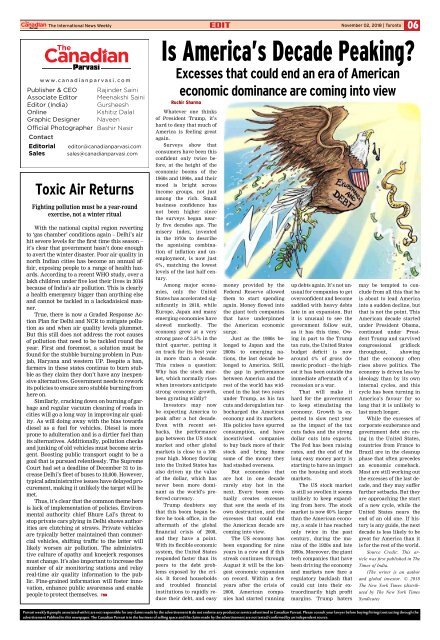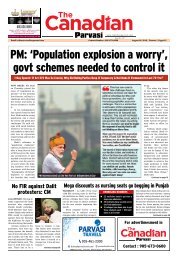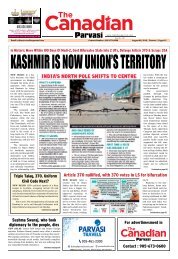The Canadian Parvasi-issue 67
Create successful ePaper yourself
Turn your PDF publications into a flip-book with our unique Google optimized e-Paper software.
<strong>The</strong> International News Weekly Edit<br />
06<br />
November 02, 2018 | Toronto<br />
<strong>The</strong><br />
w w w . canadianparv asi. c o m<br />
Publisher & CEO<br />
Associate Editor<br />
Editor (India)<br />
Online<br />
Graphic Designer<br />
Official Photographer<br />
Contact<br />
Editorial<br />
Sales<br />
Rajinder Saini<br />
Meenakshi Saini<br />
Gursheesh<br />
Kshitiz Dalal<br />
Naveen<br />
Bashir Nasir<br />
editor@canadianparvasi.com<br />
sales@canadianparvasi.com<br />
Toxic Air Returns<br />
Fighting pollution must be a year-round<br />
exercise, not a winter ritual<br />
With the national capital region reverting<br />
to ‘gas chamber’ conditions again – Delhi’s air<br />
hit severe levels for the first time this season –<br />
it’s clear that government hasn’t done enough<br />
to avert the winter disaster. Poor air quality in<br />
north Indian cities has become an annual affair,<br />
exposing people to a range of health hazards.<br />
According to a recent WHO study, over a<br />
lakh children under five lost their lives in 2016<br />
because of India’s air pollution. This is clearly<br />
a health emergency bigger than anything else<br />
and cannot be tackled in a lackadaisical manner.<br />
True, there is now a Graded Response Action<br />
Plan for Delhi and NCR to mitigate pollution<br />
as and when air quality levels plummet.<br />
But this still does not address the root causes<br />
of pollution that need to be tackled round the<br />
year. First and foremost, a solution must be<br />
found for the stubble burning problem in Punjab,<br />
Haryana and western UP. Despite a ban,<br />
farmers in these states continue to burn stubble<br />
as they claim they don’t have any inexpensive<br />
alternatives. Government needs to rework<br />
its policies to ensure zero stubble burning from<br />
here on.<br />
Similarly, cracking down on burning of garbage<br />
and regular vacuum cleaning of roads in<br />
cities will go a long way in improving air quality.<br />
As will doing away with the bias towards<br />
diesel as a fuel for vehicles. Diesel is more<br />
prone to adulteration and is a dirtier fuel than<br />
its alternatives. Additionally, pollution checks<br />
and junking of old vehicles must become stringent.<br />
Boosting public transport ought to be a<br />
goal that is pursued relentlessly. <strong>The</strong> Supreme<br />
Court had set a deadline of December 31 to increase<br />
Delhi’s fleet of buses to 10,000. However,<br />
typical administrative <strong>issue</strong>s have delayed procurement,<br />
making it unlikely the target will be<br />
met.<br />
Thus, it’s clear that the common theme here<br />
is lack of implementation of policies. Environmental<br />
authority chief Bhure Lal’s threat to<br />
stop private cars plying in Delhi shows authorities<br />
are clutching at straws. Private vehicles<br />
are typically better maintained than commercial<br />
vehicles, shifting traffic to the latter will<br />
likely worsen air pollution. <strong>The</strong> administrative<br />
culture of apathy and kneejerk responses<br />
must change. It’s also important to increase the<br />
number of air monitoring stations and relay<br />
real-time air quality information to the public.<br />
Fine-grained information will foster innovation,<br />
enhance public awareness and enable<br />
people to protect themselves. TNN<br />
Is America’s Decade Peaking?<br />
Excesses that could end an era of American<br />
economic dominance are coming into view<br />
Ruchir Sharma<br />
Whatever one thinks<br />
of President Trump, it’s<br />
hard to deny that much of<br />
America is feeling great<br />
again.<br />
Surveys show that<br />
consumers have been this<br />
confident only twice before,<br />
at the height of the<br />
economic booms of the<br />
1960s and 1990s, and their<br />
mood is bright across<br />
income groups, not just<br />
among the rich. Small<br />
business confidence has<br />
not been higher since<br />
the surveys began nearly<br />
five decades ago. <strong>The</strong><br />
misery index, invented<br />
in the 1970s to describe<br />
the agonising combination<br />
of inflation and unemployment,<br />
is now just<br />
6%, matching the lowest<br />
levels of the last half century.<br />
Among major economies,<br />
only the United<br />
States has accelerated significantly<br />
in 2018, while<br />
Europe, Japan and many<br />
emerging economies have<br />
slowed markedly. <strong>The</strong><br />
economy grew at a very<br />
strong pace of 3.5% in the<br />
third quarter, putting it<br />
on track for its best year<br />
in more than a decade.<br />
This raises a question:<br />
Why has the stock market,<br />
which normally rises<br />
when investors anticipate<br />
strong economic growth,<br />
been gyrating wildly?<br />
Investors may now<br />
be expecting America to<br />
peak after a hot decade.<br />
Even with recent setbacks,<br />
the performance<br />
gap between the US stock<br />
market and other global<br />
markets is close to a 100-<br />
year high. Money flowing<br />
into the United States has<br />
also driven up the value<br />
of the dollar, which has<br />
never been more dominant<br />
as the world’s preferred<br />
currency.<br />
Trump doubters say<br />
that this boom began before<br />
he took office, in the<br />
aftermath of the global<br />
financial crisis of 2008,<br />
and they have a point.<br />
With its flexible economic<br />
system, the United States<br />
responded faster than its<br />
peers to the debt problems<br />
exposed by the crisis.<br />
It forced households<br />
and troubled financial<br />
institutions to rapidly reduce<br />
their debt, and easy<br />
money provided by the<br />
Federal Reserve allowed<br />
them to start spending<br />
again. Money flowed into<br />
the giant tech companies<br />
that have underpinned<br />
the American economic<br />
surge.<br />
Just as the 1980s belonged<br />
to Japan and the<br />
2000s to emerging nations,<br />
the last decade belonged<br />
to America. Still,<br />
the gap in performance<br />
between America and the<br />
rest of the world has widened<br />
in the last two years<br />
under Trump, as his tax<br />
cuts and deregulation turbocharged<br />
the American<br />
economy and its markets.<br />
His policies have spurred<br />
consumption, and have<br />
incentivised companies<br />
to buy back more of their<br />
stock and bring home<br />
some of the money they<br />
had stashed overseas.<br />
But economies that<br />
are hot in one decade<br />
rarely stay hot in the<br />
next. Every boom eventually<br />
creates excesses<br />
that sow the seeds of its<br />
own destruction, and the<br />
excesses that could end<br />
the American decade are<br />
coming into view.<br />
<strong>The</strong> US economy has<br />
been expanding for nine<br />
years in a row and if this<br />
streak continues through<br />
August it will be the longest<br />
economic expansion<br />
on record. Within a few<br />
years after the crisis of<br />
2008, American companies<br />
had started running<br />
up debts again. It’s not unusual<br />
for companies to get<br />
overconfident and become<br />
saddled with heavy debts<br />
late in an expansion. But<br />
it is unusual to see the<br />
government follow suit,<br />
as it has this time. Owing<br />
in part to the Trump<br />
tax cuts, the United States<br />
budget deficit is now<br />
around 4% of gross domestic<br />
product – the highest<br />
it has been outside the<br />
immediate aftermath of a<br />
recession or a war.<br />
That will make it<br />
hard for the government<br />
to keep stimulating the<br />
economy. Growth is expected<br />
to slow next year<br />
as the impact of the tax<br />
cuts fades and the strong<br />
dollar cuts into exports.<br />
<strong>The</strong> Fed has been raising<br />
rates, and the end of the<br />
long easy money party is<br />
starting to have an impact<br />
on the housing and stock<br />
markets.<br />
<strong>The</strong> US stock market<br />
is still so swollen it seems<br />
unlikely to keep expanding<br />
from here. <strong>The</strong> stock<br />
market is now 60% larger<br />
than the American economy,<br />
a scale it has reached<br />
only twice in the past<br />
century, during the manias<br />
of the 1920s and late<br />
1990s. Moreover, the giant<br />
tech companies that have<br />
been driving the economy<br />
and markets now face a<br />
regulatory backlash that<br />
could cut into their extraordinarily<br />
high profit<br />
margins. Trump haters<br />
may be tempted to conclude<br />
from all this that he<br />
is about to lead America<br />
into a sudden decline, but<br />
that is not the point. This<br />
American decade started<br />
under President Obama,<br />
continued under President<br />
Trump and survived<br />
congressional gridlock<br />
throughout, showing<br />
that the economy often<br />
rises above politics. <strong>The</strong><br />
economy is driven less by<br />
ideology than by its own<br />
internal cycles, and this<br />
cycle has been turning in<br />
America’s favour for so<br />
long that it is unlikely to<br />
last much longer.<br />
While the excesses of<br />
corporate exuberance and<br />
government debt are rising<br />
in the United States,<br />
countries from France to<br />
Brazil are in the cleanup<br />
phase that often precedes<br />
an economic comeback.<br />
Most are still working out<br />
the excesses of the last decade,<br />
and they may suffer<br />
further setbacks. But they<br />
are approaching the start<br />
of a new cycle, while the<br />
United States nears the<br />
end of an old one. If history<br />
is any guide, the next<br />
decade is less likely to be<br />
great for America than it<br />
is for the rest of the world.<br />
Source Credit: This article<br />
was first published in <strong>The</strong><br />
Times of India.<br />
(<strong>The</strong> writer is an author<br />
and global investor. © 2018<br />
<strong>The</strong> New York Times (distributed<br />
by <strong>The</strong> New York Times<br />
Syndicate)<br />
<strong>Parvasi</strong> weekly & people associated with it are not responsible for any claims made by the advertisement & do not endorse any product or service advertised in <strong>Canadian</strong> <strong>Parvasi</strong>. Please consult your lawyer before buying/hiring/contracting through the<br />
advertisement Publised in this newspaper. <strong>The</strong> <strong>Canadian</strong> <strong>Parvasi</strong> is in the business of selling space and the clains made by the advertisement are not tested/confirmed by an independent source.

















